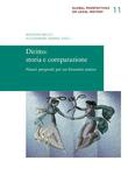Explore

Diritto: Storia E Comparazione
Eliana Augusti, Emanuele Stolfi, Vincenzo Zeno-Zencovich, Bernardo Sordi, Mario Serio, Roberto Scariglia, Giorgio Resta, Giovanni Poggeschi, Giorgia Pavani, Giovanni Pascuzzi, Luigi Nuzzo, Matteo Nicolini, Pier Giuseppe Montenari, Edmondo Mostacci, Luigi Lacchè,, Mauro Grondona, Tommaso Edoardo Frosini, Giuseppe Franco Ferrari, Thomas Duve, Tommaso dalla Massara, Antonello Calore, Salvatore Casabona, Alessandro Somma, Alfons Aragoneses, Massimo Brutti
2018
0 Ungluers have
Faved this Work
Login to Fave
"Comparative law and the history of law are traditionally devoted to expanding the context of legal rules and legal institutions. Comparison involves history, as the well-known motto proclaims, but history also involves comparison. Both disciplines are in fact interested in deepening the space-time coordinates of law as a social phenomenon, which means that they take up a critical approach to their object of study.
In recent years, this trait is increasingly coming into conflict with the tendency to present law as a mere technocratic instrument for organizing societies. As a result of the »end of history« discourse, the Western economic and political order has become a definitive point of reference worldwide, with law scholars charged with identifying best practices to enhance their efficiency.
A group of comparative lawyers and legal historians critically discuss this assumption from a theoretical point of view as well as from the perspective of their respective fields of research. The result is a multifaceted range of ideas on the significance and possible future of two disciplines that share, in addition to their traditional approach, a crisis of identity."
This book is included in DOAB.
Why read this book? Have your say.
You must be logged in to comment.
Rights Information
Are you the author or publisher of this work? If so, you can claim it as yours by registering as an Unglue.it rights holder.Downloads
This work has been downloaded 249 times via unglue.it ebook links.
- 114 - pdf (CC BY-NC-ND) at OAPEN Library.
Keywords
- Comparative law
- General & world history
- History
- history of law
- Humanities
- Jurisprudence & general issues
- Law
- legal history
- legal rules
- thema EDItEUR::L Law::LA Jurisprudence and general issues::LAZ Legal history
- thema EDItEUR::N History and Archaeology::NH History::NHB General and world history
Links
DOI: 10.12946/gplh11Editions

